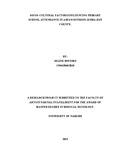| dc.description.abstract | In the 20th and part of the 21st century some countries in the less developed and
developing world have witnessed declining performance in primary schools due to
school absenteeism. The diverse socio-cultural practices with negative impact are more
pronounced in poor states than the developed world, and East Africa experiences diverse
socio-cultural practices that have greatly affected educational performance. The Kenyan
rural areas and the informal settlements in towns are affected by continuous school
absenteeism leading to poor academic performance. This study therefore assessed the
socio-cultural factors influencing primary school attendance in Asego Division-
Homabay County. The objectives were as follows; to examine the role of family
members in influencing school attendance of primary school children, to establish the
kind of activities children engage in when not attending school, to assess community
members’ role in influencing primary school attendance and to examine the sociocultural
factors that influence primary school attendance. The study adopted descriptive
survey design to collect data from the respondents. A standard questionnaire with open
and close ended questions was used. An F.G.D guide was also used to collect qualitative
data. The results were analyzed using descriptive methods. Quantitative data were
presented by use of text, frequency tables and charts while qualitative data were
presented in words and phrases. The results show that majority of the people never went
through primary education, thus have low opinion on value of education. Majority of the
parents do not care about education as a result of their ignorance of the benefits of
education as they make children absent from school to provide labour in the family,
instead of providing them with school requirements. Children when out of school engage
in activities such as: household chores, fishing, farming, and sand harvesting. The
Community is not assisting children to be positive about schooling, and the government is
held responsible for school absenteeism due to poverty on families, poor teachers’
motivation, and withdrawal of school feeding programme. Socio-cultural factors that
influence school absenteeism include: large number of children, rampant wife
inheritance, low female ownership of property, women bestowed with little household
decision making power and prevalent of dependent children in most families. Other
issues influencing school attendance included; little care from the guardians/parents,
school aged children challenged by hunger, lack of basics for primary schooling .In
Conclusion, practices and activities within the area influence school attendance of
primary school going children. The researcher therefore recommends; for adequate clear
policies to foster regular school attendance, continuous sensitization on the benefits of
education, monitoring by all the stakeholders in the primary sub sector for realization of
the value of education for children, creation of awareness through aggressive
educational advocacy to enable the people realize the benefits of education, random
check on the sand harvesting sites to ensure these sites are not hiding points for primary
school going children who do not want to attend school, this will avoid the danger of
denying children their educational right. | en_US |

